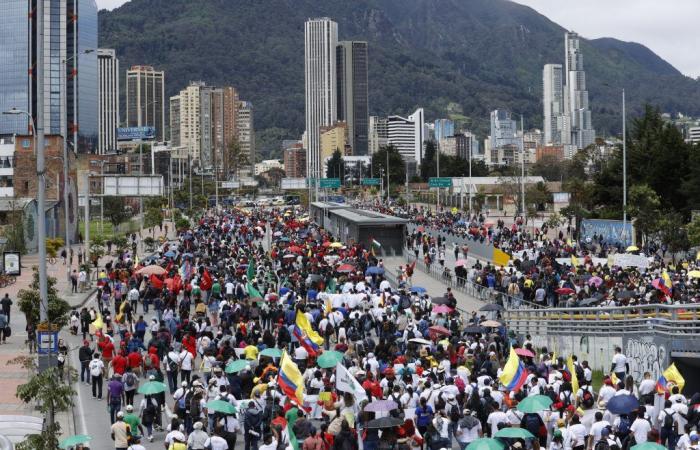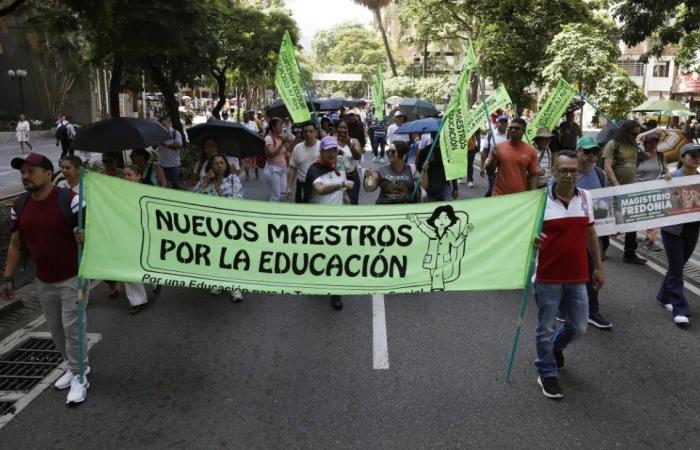Bogotá (EFE).- Tens of thousands of public education teachers in Colombia took to the streets of Bogotá in a macro protest that reached the Plaza de Bolívar, at the doors of Congress, where they reiterated that they do not want the Statutory Law of Education.
The protests were called by the largest teachers union in the country, the Colombian Federation of Education Workers (Fecode), who on their fourth and most massive day of national strike reiterated their discontent with the new statutory reform presented by the Government. They criticize that it has been transformed by the amendments that the opposition has made during its process in Congress, where it only has one debate left to be approved.
“Down with the amendments and the monkeys (as in Colombia they call the articles that sneak into the process of the laws) that they want to put us in” shouted, megaphone in hand, the teachers who came out to protest from the National University headquarters in Bogotá. , one of the four key points in the city from where the marches started.
“The monkey they put in us wants to privatize education and we cannot allow it,” a protester told EFE, who participated in a small theater in the middle of the parade in which his companions pretended to attack him “for education as a fundamental right.”
Education, a fundamental right
The statutory bill represents an important change in the country’s law because it seeks to expand public education from ages 5 to 15, as stated in the Constitution, to three grades of preschool and university. And thus, update the country’s educational system to international standards, paying off a debt in compliance with constitutional mandates.
Declaring education a fundamental right would prevent teacher strikes, a means frequently used by Fecode to put pressure on different governments.
One of the directors of the District Association of Education Workers (ADE), William Javier Díaz, told EFE that his fight is for “a true law for education in Colombia, defending its free nature, its state nature and the financing it has to have.”
With the march, as Díaz highlights, they do not want to protest against Petro’s left-wing government, which they even supported with campaign financing. He but against the amendments that he has suffered in his processing in Congress, where it was scheduled to be debated today, but has not been scheduled.
“We will be in the streets and we will carry out not one or two but many social outbursts until our rights are returned,” he added.
“We are not afraid of evaluation,” say teachers
Professors from various departments of Colombia came to the national strike, including a group from Valle del Cauca, chaired by the general secretary of the Unitary Central of Workers (CUT) of that region, Luis Fernando Jaramillo. Who highlighted to EFE that they are “the most evaluated teachers in the entire world.”
One of the reforms that has caused the most stir among union complaints is Article 39 of the reform, which establishes that the results of young people in State exams will be used to evaluate teachers.
This evaluation is what would allow them to ascend the ranks of the teaching profession, although Jaramillo stated that what worries them is not the evaluation but the means: “What we are not going to allow is to be evaluated with the neoliberal criteria of Paloma Valencia ( Uribe senator).
Support for teachers and some excesses
To the thousands of teachers who took to the streets, they were joined by students from the National University (public), who, shouting ‘Long live the U, long live!’, threw themselves into the defense of their professors.
However, as the march reached the Memory and Reconciliation Center, hooded young people with spray cans began to paint and break the windows of Transmilenio stations with writings such as ‘Transmiseria’ and ‘(memory center) without memory’, receiving boos from the teachers who rejected his actions.
“This is also education! We only have transportation fare or lunch, not both,” one of the hooded men, who did not mention his name, told EFE.



